
The incident occurred on Tuesday, 17 June, when the tankers ADALYNN and Front Eagle collided and caught fire. Satellite heat signatures detected by NASA's Fire Information for Resource Management System confirmed the blaze early that morning. Emirati authorities said crew members were safely evacuated and no injuries were reported.
However, Greenpeace has warned of a potentially serious spill, pointing to satellite imagery showing a visible oil slick stretching across an estimated 1,500 hectares. The environmental group said the ADALYNN, a 23-year-old vessel reportedly linked to Russia's so-called "shadow fleet," may have been carrying up to 70,000 tonnes of crude oil.
"This is just one of many dangerous incidents in recent years," said Farah Al Hattab of Greenpeace's Middle East and North Africa division. "These oil spills pose a major threat to marine life and regional ecosystems."
The UAE Ministry of Energy and Infrastructure has not yet commented on the incident.
Maritime security under scrutiny
While the cause of the collision remains unclear, UK-based maritime security firm Ambrey has stated there is no immediate indication that the crash was linked to ongoing regional tensions between Iran and Israel.
Nonetheless, the incident has renewed concerns about the vulnerability of one of the world's most important energy corridors. The Strait of Hormuz handles roughly 20 million barrels of oil per day—nearly a fifth of global supply—according to the US Energy Information Administration.
Following Israeli airstrikes on Iran earlier this month, oil prices spiked amid fears that the Strait could be targeted in retaliation. Shipping operators have since reported disruptions, with vessels experiencing navigational blackouts and relying more heavily on radar systems.
Maritime analysts say shipowners are becoming increasingly reluctant to operate in the region. Frontline, the Norwegian oil tanker giant that owns the Front Eagle, recently told the Financial Times it would avoid taking on new contracts that involve passage through the Strait of Hormuz.
As regional instability continues to intensify, environmental groups warn that the risks of an ecological crisis at sea are growing—particularly in a heavily trafficked zone where accidents could have global repercussions.